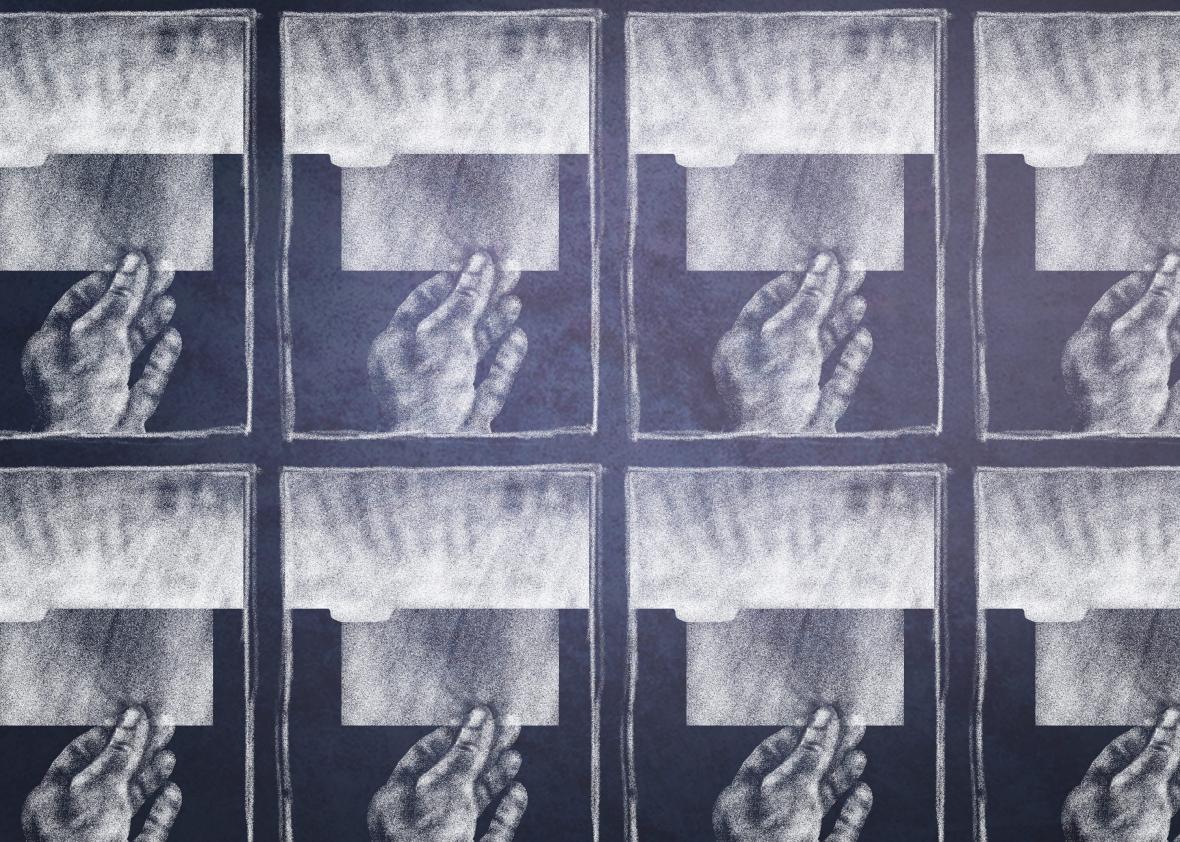Halfway through Karin Tidbeck’s new novel Amatka, a woman named Vanja begins an office job. She spends her first day paddling through a sea of paperwork, filing page after page of documents attesting to the most mundane developments in the lives of those around her—births, deaths, educational milestones, retirements. When she returns home, her hands are pale from the labor. “That night, she had a completely normal dream: she sorted forms,” Tidbeck writes.
In any other narrative, this would be a scene of near-fatal drudgery, evidence of bureaucracy’s tiresome weight. In Amatka, by contrast, the sequence is almost comforting. Here, at least, there is something resembling normalcy, a sign that the center might hold, that reality might cohere. It does not, not for long. Something like a falcon keens in the wilderness beyond town. The falconer can only ignore its call for so long. This is a story about the way reality crumbles—a timely and troubling novel that ranks among the best works of queer science fiction.
We often praise science-fiction writers for their deft world-building, a term that suggests a capacity to imagine fully rendered elsewheres into being, places that feel so right we forget their dreamed-up origins. Tidbeck, a student of the weird fiction impresarios Anne and Jeff VanderMeer, is something more like a master of unmaking. The substance of Amtaka is forever slipping away: The better we come to know its rules, those measures of its materiality, the more we realize they are not our own.
Vanja herself learns that fact in time, but she is almost innocent as the novel begins. When we first meet her, she has just boarded a train. Her destination, Amatka, is one of four extant colonies scattered across an unnamed world. (Once, we are told, there were five cities, though we only gradually learn what happened to the fifth.) There are no windows on the train, a fact that Vanja unquestioningly accepts: “Everyone knew that there was nothing out there except the empty steppe: billowing grass, some hillocks, and combes.”
A sort of corporate anthropologist, Vanja travels to Amatka to learn more about the way its mushroom-farming citizens live, the better to sell them products they might not be able to make themselves. Tidbeck hints at some trauma in Vanja’s past, one that has eaten away at her body and possibly broken her spirit. In Amatka, however, she quickly begins to fall in love with a woman named Nina. Though their budding romance is subdued, Tidbeck’s almost clinically spare prose sometimes grows rapturous when the two women are close to one another. At night, they huddle close in a small bed made for one, their bodies a mutual buffer against the alien cold.
Just as Vanja and Nina cling to one another, the other residents of Amatka desperately strive to hold their world together, studiously guarding its normalcy. They inscribe almost every object with words describing what it is. They speak the names of things around them, calling on them to remain what they are. As children, they learn “The Marking Song,” and they continue to sing it throughout their lives:
Let’s mark all the things in here.
Table, chair, and a pot here;
Stovetop, fridge, and pantry there.
We mark all things in our care.
We soon discover what happens when they fail to comply: A few chapters in, Vanja’s toothbrush—on which the word “TOOTHBRUSH” had begun to fade—dissolves into a puddle of inchoate goop. The substance horrifies Vanja, inspiring “a sudden vision of the contents escaping, slithering up her arms.” Soon after, her suitcase—already in ill repair—goes too. In Amatka, both the town that shares its name and the whole universe of the novel, language keeps the order of things in place. Fail to guard the words that describe them and objects threaten to become other than what they have been.
Some Amatkans suggest that Vanja’s carelessness might be telling, indicative of a deeper discontent with, possibly even resentment toward, the very constitution of their collective reality. For Tidbeck’s characters, that’s a frightening possibility. If language shapes the world into recognizable forms, its words might turn also bend substance into stranger shapes. A pencil is never far from shifting into a spoon, a spoon from changing into a key. Who knows what doors that key might unlock?

Vintage
The colonists know this much: Their world has never been entirely their own. In Vanja’s childhood, her dissident father whispered stories of how her people came to be there. “No one knows where we are. But we’re not allowed to say that,” he told her. They had discovered “a hole” in their old world, a world that seems to be ours—yours and mine. When they passed through it, they discovered that others had been there before, leaving abandoned buildings behind. “The architecture was alien, the proportions inhuman: huge, lumbering houses, with odd angles,” Tidbeck writes. Nothing captures the slow horror of Tidbeck’s prose quite like the adjective “lumbering,” a word that suggests even inanimate matter might have life, maybe even a will, of its own.
The colonists’ offspring protect them against this ambiguous menace, each new generation trained to say the right words at the right time, guaranteeing that things will stay as they are. Even Nina has children of her own, and Vanja’s failure to reproduce is treated as a profound failure, largely because it is a threat to collective security. In this, there are echoes Lee Edelman’s seminal queer theory treatise No Future, which argues that we have turned the very idea of childhood into a conservative prop, one designed to ensure that all our tomorrows will look just like our yesterdays.
That struggle to collapse future into past pervades the novel. An “old evening poem” posted on Nina’s wall, for example, reads:
as evening comes
we keep in mind
when morning’s here
all will remain;
as morning comes
we keep in mind
today’s the same
as yesterday
From the start, this is a novel about trying too hard to make things stay the way they are now and used to be. At times, it brings to mind Philip K. Dick’s Man in the High Castle, where the inhabitants of an Earth on which the Axis powers won World War II try to dream their way into a kinder timeline. But when Tidbeck’s characters sing the marking song, they are not fighting a false reality so much as they are engendering it. Buzzing like a Trumpian beehive, they insist the world around them is fake in order to invent their own truths.
Unsurprisingly, then, Amatka is a chillingly apt story for our moment. But for all that, it is not quite a novel of our moment. Indeed, it’s an odd text in a time when calls for “resistance” are often synonymous with efforts to protect increasingly fragile norms. Today, we do not march and protest to make the world better so much as to keep it from growing worse. Tidbeck’s work, by contrast, calls to mind the queer politics of an earlier era—one more closely aligned with the thought of Michel Foucault than the activism of the Human Rights Campaign—that sought to upend constituted powers and internalized norms. By its conclusion, though, this novel, which begins as a story of individual estrangement, morphs into something too strange to sustain the comfort of easy parallels. Amatka’s resistance to allegory—and the accompanying refusal to offer anything like an affirmative moral—may ultimately be the source of its power.
–
Amatka by Karin Tidbeck. Vintage.
